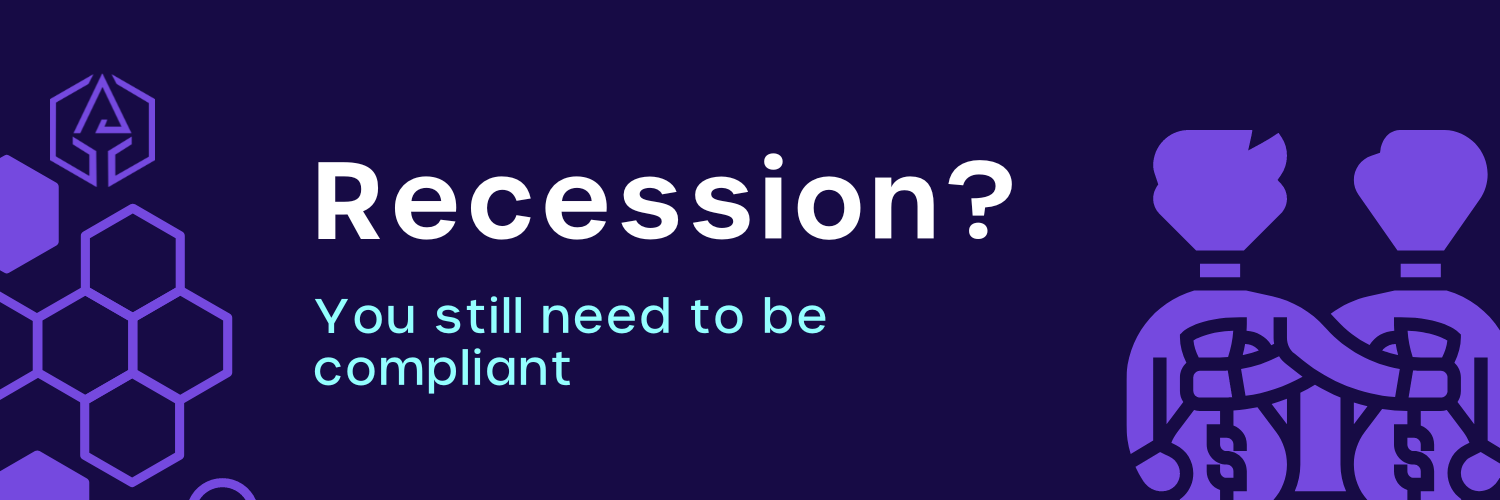Compliance during recession

Compliance during recession
Cyvatar | 02/24/2023Recession? You still need to be compliant.
Concerns about a broader economic slowdown in the coming year have prompted several tech companies to restrict hiring or lay off personnel proactively. No area of the technology industry seems to be immune to the worsening economic conditions.
For various reasons, experts believe the cybersecurity industry will bear the least brunt of an economic crisis. Why? Because in an economic bust, cybercrime booms. You need the best cybersecurity talent to keep you protected and compliant with all regulations.
Let’s begin with the economy. A worldwide economic recession appeared unlikely a year ago. However, as Russia invaded Ukraine, trade talks between China and the United States dragged on and politics worldwide got more volatile, the worry of a recession has seeped into our daily conversations.
Simultaneously, mounting fears of a cyberattack or big data breach have executives looking over their shoulders, wondering if their internal security is adequate and gauging the necessity and cost of compliance.
This very bleak assessment of what CEOs fear is included in The Conference Board’s recent report, C-Suite Challenge 2019, which projects high inflation beyond 2023. These findings are all based on interviews with 800 CEOs from the United States, Europe, and Asia, and 600 additional C-Suite executives.
The fear that trade disputes may spark a global recession is now the top external concern for almost all executives worldwide. At the same time, the main internal challenge is acquiring and maintaining outstanding personnel, not to mention affording compliance during a recession.
As the cost of cleaning up and recovering from catastrophes rises, cybersecurity (particularly in the United States) is beginning to outrank many other issues. According to a Radware analysis, the figure is around $1.1 million per event.
In Europe, on the other hand, there is considerable concern about regulatory and compliance difficulties (like the EU’s General Data Protection Regulation) as a direct response to these types of breaches.
Why do you need cybersecurity compliance during a recession?
One might think that the correlation between recession and compliance implies higher expenditure during a time of financial crisis or stress.
However, the cost of compliance entails several precautionary measures organizations (including SMBs and startups) must follow to ensure that a data breach or threat actors do not cause more damage in an already tumultuous period.
Compliance costs could occur by addressing basic security needs.
While WiFi security has progressively improved, home networks are still more vulnerable to cyber attacks than corporate ones.
Increased pressure to get personnel and systems up and running fast for remote work may result in violating essential security standards unwittingly. Networks should have adequate protection at all entry points, including firewalls and multi-factor authentication.
Companies should also consider system patching for virtual private networks (VPNs) and implementing increased system monitoring to mitigate risks exacerbated by a remote workforce. Furthermore, businesses should be wary of phishing and other social engineering hacks.
These approaches frequently instill a false sense of urgency, and COVID-19 provides enough chances to exploit a nervous workforce. Companies should be aware of their ability to handle incident response remotely and implement preventative measures.
This is because failure to launch a timely and effective response may result in reputational damage from cyber attacks and increased legal costs from data breaches.
What exactly is cybersecurity compliance?
Cybersecurity compliance is an organizational risk management strategy matched with predefined security measures and controls on how data confidentiality is protected through administrative procedures.
Companies are encouraged to create a systematic risk governance approach that complies with the controls imposed by regulatory bodies, legislation, and industry-relevant units to meet data management and protection standards. It establishes industry standards translated into instrumental reliability reflections for customers to signify good service delivery.
A regulatory-compliant information security management system instructs organizations on what preventive actions should be taken and protocols enabled to construct a pre-breach context inside internal procedures and keep the probability of breaches to a minimum.
It also establishes an obligatory response plan in the aftermath of a breach to notify the facts and impact of the breach to impacted parties.
The Importance of Cybersecurity Compliance
It’s critical to recognize that cybersecurity compliance is more than just a set of stringent and required standards imposed by regulatory authorities– it is also crucial for overall business performance.
Any organization can become a victim of a cyber attack. Small businesses, in particular, make themselves easy prey for criminals because it is common to believe that if you are small, possible threats will pass you by. However, a failure to invest in a solid cybersecurity posture exposes weaknesses that are attractive to malicious actors.
Regardless of the size of the firm, data breaches swiftly grow, leading to very complex circumstances that harm the reputation and financial capability of the company, resulting in legal actions and conflicts that can take years to resolve.
Meeting cybersecurity compliance standards alleviates the most significant threat factor and its consequences.
IT security compliance aids in the establishment of continuous monitoring and evaluation processes for devices, networks, and systems in order to meet regulatory cybersecurity compliance standards.
A compliance program of this type enables firms to assess risk, develop a framework to protect sensitive data, and reduce data breach threats.
The following are a few key factors that make cybersecurity compliance necessary, recession or no recession.
- An instrument for risk assessment
Compliance duties include rules and regulations that examine the most critical systems and procedures in charge of securing sensitive data that firms acquire and manage.
Establishing the best security practices “by the book” diminishes the probability of an error within the processes.
When developing and executing a cybersecurity framework within an organization, clear rules assist in following the risk assessment checklist that targets weaknesses and focuses on priorities.
Data protection rules and regulations are critical for establishing a good foundation of your organization’s cybersecurity program.
- Standard in the industry
Aligning security practice standards among enterprises assists IT professionals, compliance officers, and overarching regulations in setting and supervising cybersecurity standards, avoiding misinterpretations, and complicating corporate operations.
Aligned procedures and a cybersecurity framework can be viewed as a risk mitigation measure for consumers who don’t have to research every company’s security requirements if they meet user expectations for data protection.
Unified policies simplify and optimize B2B and B2C service transactions, saving valuable resources and establishing knowledge to make suitable decisions.
- Avoid regulatory penalties
Conducting fair practices that correspond to regulatory requirements is recommended to avoid penalties resulting from unfortunate events such as a data breach– that exposes consumer personal data, whether an internal or external breach that becomes public information.
In the event of misbehavior, regulatory organizations thoroughly investigate it, which usually results in a considerable fine.
On one hand, it serves as a reminder that businesses must implement solid security compliance procedures in the interests of third-party interests; on the other hand, it helps convey to other companies that data protection is not a joke.
Significant cybersecurity compliance requirements to maintain during a recession
Various cybersecurity regulatory regulations define cybersecurity compliance criteria. Even though they are independent methodologies, their target content often overlaps and aims for the same goal: creating rules that are simple to follow and adapt to the company’s technology environment, eventually securing sensitive data.
Major compliance obligations may apply locally and worldwide, depending on the business’s location and the markets in which it operates and handles data.
Regulatory constraints also restrict the type of data companies maintain and the information it contains.
The primary focus is data security, which includes personal information that can be used to identify a person– complete name, personal number, social security number, address, date of birth details, or other sensitive information such as individual health status.
Companies with access to confidential data are more vulnerable because it is a popular target for hackers.
Some of the major compliance regulations and regulatory bodies are listed below:
- HIPAA
The Health Insurance Portability and Accountability Act (HIPAA) is a federal law passed in the United States in 1996.
It applies to sensitive health-related information. Companies must follow HIPAA privacy requirements if they communicate health information electronically in conjunction with covered transactions– such as processing claims, receiving payment, or sharing information.
The Act establishes three significant components:
- Privacy standards
- Security requirements, and
- Search notification rules for reporting incidents
HIPAA standards and regulations ensure that organizations– health care providers, health plans, health care clearinghouses, and business associates– do not reveal sensitive data without an individual’s consent.
Your healthcare option could be awesome, but is it safe? HIPAA helps address it.
However, the HIPAA Privacy Rule does not apply to enterprises outside the United States.
- FISMA
The Federal Information Security Management Act (FISMA) governs federal U.S. systems that safeguard national security and economic interest information, activities, and assets from a breach.
The information security policy, issued in 2002, is a comprehensive framework for administering and implementing risk management governance inside government entities and commercial partners.
The FISMA establishes minimum security requirements for national-level agency systems to ensure threat prevention.
The framework scope includes inventorying information systems, maintaining system security plans and controls, conducting risk assessments, and providing continuous monitoring.
The Act is consistent with current laws, presidential orders, and directives addressing cybersecurity process compliance in information security initiatives.
- PCI-DSS
The Payment Card Industry Data Security Standard (PCI-DSS) is a non-federal information security requirement for the safety and security of credit card data.
Major credit card providers manage the standard administered by the PCI Security Standards Council; the primary purpose is to protect cardholder data.
Regardless of the number of transactions or credit cards handled monthly, the PCI-DSS standard applies to retailers who manage payment information.
Businesses must adhere to 12 basic standards, including firewall setup, password protection, and data encryption; restrict access to credit card information; and develop and maintain security systems, processes, and policies to be PCI compliant.
Non-compliant organizations risk losing their merchant license, which means they will be unable to take credit card payments for several years.
Businesses that do not have PCI-DSS become possible targets for cyber assaults, resulting in reputational harm and financial penalties from regulatory agencies of up to $500,000 in fines.
- GDPR
The General Data Protection Regulation (GDPR) is a data protection and privacy law that was released in 2016 and applies to countries in the European Union (EU) and the European Economic Area (EEA).
The GDPR creates a legal framework that governs the gathering and protection of personal data for EU-based citizens.
The GDPR requires businesses to give explicit terms and conditions surrounding consumer data collection policies and allow individuals to modify their data availability without restriction.
Individual permission is a mandatory need for organizations to process personal information, ensuring its confidentiality, security, and duty to notify during a data breach.
- ISO/IEC 27001
ISO/IEC 27001 is an international standard for implementing and administering Information Security Management Systems (ISMS) that is part of the ISO/IEC 27000 family of standards developed by the International Organization for Standardization (ISO) and the International Electrotechnical Commission (IEC).
Business accreditation to ISO27001 denotes an organization’s commitment to compliance at all levels of the technological environment — workers, processes, tools, and systems — a complete setup to assure the integrity and security of personal consumer data.
The standard offers comprehensive operational actions and techniques for constructing a robust and dependable cybersecurity management system.
Stay compliant with Cyvatar
No matter how revolutionary your technology is, if there is no control process in place, it won’t be effective.
Cyvatar’s democratized cybersecurity was meant for businesses of all sizes. Its very design of it makes cybersecurity and compliance affordable.
Choose the plans that fit your needs or get in touch with our cybersecurity experts to help you with your compliance needs.
Did you know that you can get started with our Freemium plan? Get on board for free now.
